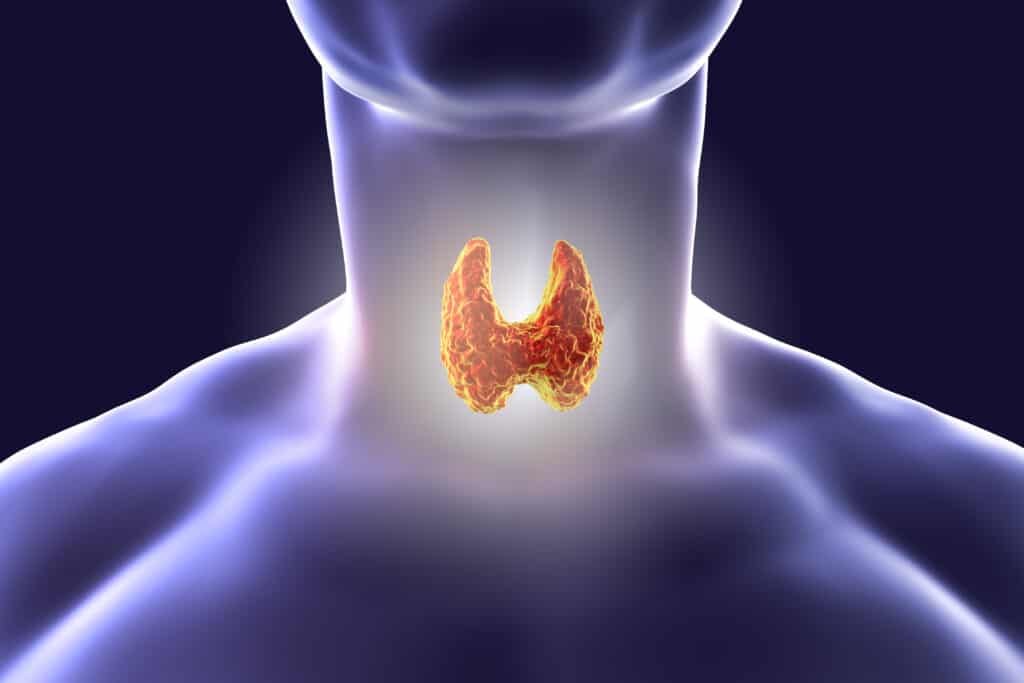
Hormones control our bodily functions—body temperature, menstrual cycle, regulation of metabolism, muscle strength and more. A balance of hormones is necessary for regular function. Any variation from the optimal balance can result in health issues – the thyroid gland is a potential cause of several of these problems.
The thyroid is a butterfly-shaped gland located beneath the larynx. It helps regulate body functions such as metabolism, growth, and development of the body by releasing a steady amount of hormones into the bloodstream. There are two main hormones that the thyroid releases: thyroxine (T4) and triiodothyronine (T3), controlling the speed of the body’s metabolism.
Abnormal thyroid hormone levels may lead to several conditions such as hypothyroidism, Hashimoto’s disease, hyperthyroidism, Graves disease, and goiter. Women are six times more likely to suffer from thyroid problems than men.
Since the symptoms vary for each person, thyroid diseases are difficult to diagnose. Experiencing them does not guarantee a thyroid problem since it can be associated with non-thyroid-related conditions such as menopause and cognitive problems; however, there are early warning signs to be aware of:
The thyroid is a butterfly-shaped gland located beneath the larynx. It helps regulate body functions such as metabolism, growth, and development of the body by releasing a steady amount of hormones into the bloodstream. There are two main hormones that the thyroid releases: thyroxine (T4) and triiodothyronine (T3), controlling the speed of the body’s metabolism.
Abnormal thyroid hormone levels may lead to several conditions such as hypothyroidism, Hashimoto’s disease, hyperthyroidism, Graves disease, and goiter. Women are six times more likely to suffer from thyroid problems than men.
Since the symptoms vary for each person, thyroid diseases are difficult to diagnose. Experiencing them does not guarantee a thyroid problem since it can be associated with non-thyroid-related conditions such as menopause and cognitive problems; however, there are early warning signs to be aware of:
Weight Gain or Loss
Aside from regulating the speed of your body’s metabolism, it can also affect the intensity of hunger you feel. Increase in appetite leading to weight gain is caused by hypothyroidism, while reduced appetite leading to weight loss is associated with hyperthyroidism. Measuring the amount of oxygen your body uses over a certain period of time is one way to test early thyroid disorders. This is called the basal metabolic rate. A score of negative 20% may indicate hypothyroidism while a BMR percent of positive 20% may indicate hyperthyroidism.
Fatigue
A common symptom of menopause for middle-aged women is fatigue. Though taking estrogen helps in menopausal symptoms, if there is no improvement in symptoms then they may be due to thyroid issues.
Usually, the feeling of being tired may be relieved by a relaxing activity or a full night’s sleep, but the fatigue caused by hypo- or hyperthyroidism cannot be easily resolved. Additionally, muscle strength is also controlled by thyroid hormones so having any of the two conditions may impact your ability to lift heavy stuff, climb stairs, or any activity that would require optimum power and muscular strength.
Usually, the feeling of being tired may be relieved by a relaxing activity or a full night’s sleep, but the fatigue caused by hypo- or hyperthyroidism cannot be easily resolved. Additionally, muscle strength is also controlled by thyroid hormones so having any of the two conditions may impact your ability to lift heavy stuff, climb stairs, or any activity that would require optimum power and muscular strength.
Sensitivity to Cold/Heat
Weight loss in hyperthyroidism and usage of more calories than normal does not affect the weight alone, but also the body’s sensitivity to heat. Sweating vigorously in an optimal environment is due to an abnormal level of the hormone thyroxine, also known as T4. On the other hand, having cold hands and feet in a warm environment may be caused by hypothyroidism. There is insufficient production of thyroxine that triggers the body’s metabolism to slow down, resulting in intolerance to cold temperatures.
Irregular Heart Rate
This is the most concerning symptom of thyroid problems since they also regulate heart rhythm. A slowed heart rate due to not enough thyroid hormone may cause the arteries to lose elasticity, resulting in high blood pressure and cholesterol levels. Worse, it may lead to coma. On the other hand, an increased heart rate during normal days may signify that too much thyroid hormone is being released. This may lead to atrial fibrillation, palpitations, or heart failure.
Hair Loss
Growth and development are impacted by thyroid hormones including hair growth. Fluctuations in hormone production may cause hair thinning or totally prevent the hair from growing out on the scalp and eyebrows. One common condition that is associated with hypothyroidism (but not caused by it) is alopecia areata or patchy baldness.
When should you consult your doctor?
If any of the symptoms have been occurring for several days to weeks, without a clear explanation, it is advisable to contact your health care provider. You can also examine yourself for any change in the size of the thyroid gland or lump in the throat, most especially if you have a family history of thyroid disease; however, there is often no notable change palpable in hypothyroidism. Thyroid hormone levels circulating in your blood are checked through blood work in the laboratory.
Monitoring your thyroid health is important as the majority of your bodily functions will be affected once an abnormality arises. Consulting a medical professional will aid in accurate diagnosis and treatment plan since thyroid disorders manifest differently on everyone.
Monitoring your thyroid health is important as the majority of your bodily functions will be affected once an abnormality arises. Consulting a medical professional will aid in accurate diagnosis and treatment plan since thyroid disorders manifest differently on everyone.
Sources and More Information
Associated Endocrinologists, “7 Early Warning Signs of Thyroid Issues”
https://www.endocrinemds.com/blogs/7-early-warning-signs-of-thyroid-issues/
Cleveland Clinic, “Thyroid Hormone” https://my.clevelandclinic.org/health/articles/22391-thyroid-hormone
HealthMatch, “What Are The Early Warning Signs Of Thyroid Problems? https://healthmatch.io/hyperthyroidism/what-are-early-warning-signs-of-thyroid-problems
Cleveland Clinic, “Thyroid Hormone” https://my.clevelandclinic.org/health/articles/22391-thyroid-hormone
HealthMatch, “What Are The Early Warning Signs Of Thyroid Problems? https://healthmatch.io/hyperthyroidism/what-are-early-warning-signs-of-thyroid-problems


